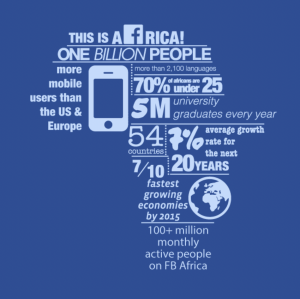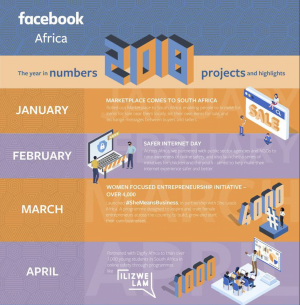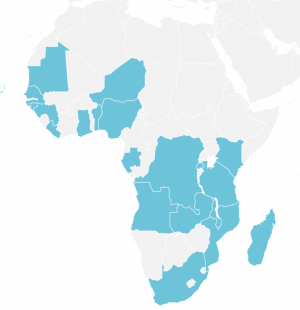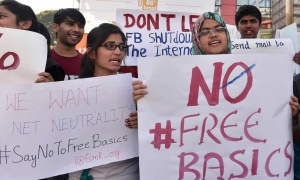Facebook in Africa
Facebook in Africa differs from Facebook in the Western world. In Western cultures, Facebook is seen as a social media platform that allows users to connect with old friends and share content. On the African continent, Facebook has had a different impact: it has lead the movement towards free internet by creating Free Basics, a company which serves to provide users access to websites in areas with little to no internet connection. Facebook has taken an interest in launching initiatives in Africa due to the growing presence of mobile phones on the continent. There are roughly 139 million Facebook users per month in Africa, and around 98% of them are connected via mobile devices. The implementation of this new technology in Africa brings about several ethical implications. Free Basics has prompted the dissemination of fake news due to the lack of digital literacy among many new African users. In addition, Facebook, and subsidiary Free Basics, has been accused of possessing too much control over the digital lives of users in this region.
Contents
Facebook Accessibility
Africa remains the fastest growing region in mobile advancement.[1] More people have access to mobile devices than to electricity in Africa, and appropriately, these mobile devices require a battery life much different than that of devices in more developed regions, with batteries that last almost a week long.[1] Africa’s access to mobile phones has made it possible for citizens to communicate efficiently, obtain mobile banking accounts, and enjoy access (albeit limited) to internet services - therefore completely “leapfrogging” past landline telephony.[2]
Free Basics
Free Basics is a Facebook-developed mobile application that gives users access to the social media platform in places where the internet is not easily or cheaply accessible. Originally named Internet.org, the app was launched in 2013 with the purpose of providing affordable internet access to less developed countries.[3] It was founded upon the idea that Africa's growing cell phone ownership - along with internet accessibility rates around 15.5% on the continent - provided Facebook with a unique opportunity to "bridge the accessibility gap."[4]
Free Basics provides users a set of websites free of mobile data charges. These websites are often stripped of photos and videos, leaving users with plain text content only.[5] The services offered included Facebook itself, news sites, health information, and job search sites. The access is extremely limited and restricted to websites that would enable the population of Africa to make generally more informed decisions about their lives. However, the new introduction of the internet to billions of people in these societies has come with many controversies.
Ethical Concerns
Online Behavior
Facebook and internet users in Africa have significantly less options and freedoms than users in America. The idea of privacy, information transparency, fake news, digital embodiment which have become a part of daily life in the western world are all foreign concepts to early internet users. The initial purpose of Internet.org, according to Mark Zuckerberg, was to offer users free access to news and other practical services.[6] Zuckerberg himself believes that access to the internet is among our basic human rights, and that this access has the power to lift people out of poverty.[7] While this may have been his intention, the reality of this program is that users are not receiving the information they need. Instead, users fall into the category of passive consumers because Free Basics only offers them a small portion of information. When searching for news, users react to articles with clickbait headlines and don't have the internet literacy skills to be able to sift through the news topic and obtain a well rounded view of the issue. Because of this, fake news has become a huge issue in Africa. Free Basics’ goal of providing clarity, information, and accessibility to a huge population of people has backfired by causing internet-illiterate users to believe falsities rather than find answers to news or health queries, a phenomenon which has been known to have dangerous consequences. Furthermore, as Africa is a continent where there are very few protections for digital privacy and laws about freedom of online expression, it has become a concern of many governments that Facebook is exploiting Africa’s lack of technical literacy to drive their business and profits. After failed efforts in Myanmar to protect users safety online, Facebook wrote that they were initially too “idealistic” in their efforts. They claim that moving forward they will invest in creating safeguards including fact-checking and support for digital literacy efforts around the globe.[8]
Digital Colonialism and Net Neutrality
Facebook has also experienced extreme backlash as opponents of Free Basics claim that the movement and services are considered digital colonialism and violate net neutrality. Digital colonialism in this context is the idea that Facebook maintains control over the digital lives of Africa’s population, masking their profit motives as a philanthropic gesture. The content that is viewable with the service is mostly western corporate news and ideologies. Many citizens in Africa have voiced that the articles they find online with Free Basics are not articles that they have any interest in. [5] In this sense, Facebook has power over the content that billions of users can read, and the content is largely dominated by western ideas revealing an eerie view into the colonial past.
Facebook has also been criticized for violating net neutrality, which is the principle that internet service providers should treat all users, content, and websites equally. [9]Net neutrality is an often debated subject as some people believe that large technology companies should be allowed to charge different prices for their content or for faster speeds, while many disagree. In India specifically, Facebook faced backlash in regards to violating net neutrality. Activists believed that Free Basics was charging different prices for sites - some were free and some were on a "premium" package. [10]
Societal Costs
Although it is stated in the name, Free Basics is not necessarily free. This can often be seen as a scam because it may be free for the users, but someone else in a different place must be paying for this, which brings about a large issue. Basically, Free Basics allows its users to access Free Basics without a cost, but only for the bare services; anything above that costs more. Facebook has been accused of following the “freemium to premium” model as they introduced this free internet service to customers around the continent of Africa and then plan to offer premium services for increased access. [11] The debate in India ended in 2016 when India's telecom regulator banned the differential pricing tactics of Free Basics stating that this tactic was allowing Facebook to determine the population's interaction with the internet and therefore obtaining too much power and control over user's internet experiences. A similar story is expected to happen in some parts of Africa if Facebook does not address these concerns. One of the main issues regarding this is that often times the users are unaware that they are being charged more and they simply cannot afford to pay extra for a service that promotes itself as being free [12].
Future of Facebook in Africa
Concerns
Facebook is confronted with many obstacles and controversies in its seemingly altruistic initiatives in Africa. Since Facebook is offering a limited option of sites for user's to view, and the company is ultimately deciding what is most important for the population, Facebook's views and preferences will automatically be implanted in the user's internet experience. Although the African continent struggles with a lack of access to health and educational news, it is inevitable that the content they are exposed to is filtered through the view of what Facebook considers most important for the population rather than what the population deem important by themselves. Ultimately, Facebook will receive backlash for these ideas but many of these complications are unavoidable by nature. Mark Zuckerberg, Facebook CEO, and Nicola Mendelsohn, Facebook vice president, have both visited Africa and have assessed the use of Facebook and the internet on the continent. From their visits, they expected Africa to contribute greatly to the next billion of users that will join Facebook. Africa seems to foster an environment where entrepreneurs thrive and Facebook will help with this [13]. It is imperative that Facebook effectively addresses these concerns as that they continue their work in the region.
Positive Outlook
Facebook's desire to connect the continent of Africa to the internet can be viewed in a negative light, allowing Facebook to monopolize an entire continent. However, the work to digitally modernize the continent with the lowest internet usage has positives to it. As of March 2019, only 35.9% of Africans have access to the internet and despite making up roughly 16% of the world's population, Africans only account for 10.9% of the world's internet users[14]. In order to combat this Facebook attempted to launch a new satellite into orbit in late August, 2016 however, a launch error occurred and destroyed the rocket carrying the satellite on the launch platform[15]. While individuals against Free Basics view this incident in a positive light, the delay in internet access across Africa is only hurting the 1.3 billion people who desire a means of joining the digital world. Not only would internet access allow for the assimilation of Africans into the global world but it would allow for an increase in knowledge of African culture and language, as well as an improved economic situation across the continent. Research conducted by Deloitte predicted that catching African people up to the level of internet use as in the Western world would add 140 million jobs, pull 160 million people out of poverty, and add $2.2 trillion to African economies[16]. Some of these new jobs are already emerging the the tourism industry, as nations such as Kenya turn to internet, specifically social media, marketing to entice tourists to their country[16]. Today millions speak African languages ,such as Xhosa, Kishawhili, and Yoruba, within countries on the African continent but few outside Africa know anything of these unique languages. Spreading knowledge and awareness of these languages and their cultures is achievable with an increase in connectivity with people outside local African regions[17].
See Also
References
- ↑ 1.0 1.1 Shapshak, Toby. Almost All of Facebook’s 139 Million users in Africa are on Mobile. Forbes. December 18th 2018. https://www.forbes.com/sites/tobyshapshak/2018/12/18/almost-all-of-facebooks-139m-users-in-africa-are-on-mobile/#3ab2bd5d68e7.
- ↑ The Economist. In much of sub-Sahran Africa, mobile phones are more common than access to electricity. November 8, 2017. https://www.economist.com/graphic-detail/2017/11/08/in-much-of-sub-saharan-africa-mobile-phones-are-more-common-than-access-to-electricity
- ↑ Free Basics/Internet.org https://en.wikipedia.org/wiki/Internet.org
- ↑ Siddharth Singh, Vedant Nanda, Rijurekha Sen, Sohaib Ahmad, Satadal Sengupta, Amreesh Phokeer, Zaid Ahmed Farooq, Taslim Arefin Khan, Ponnurangam Kumaraguru, Ihsan Ayyub Qazi, David Choffnes, and Krishna P. Gummadi. 2017. An Empirical Analysis of Facebook’s Free Basics Program. In Proceedings of ACM Sigmetrics conference, Urbana-Champaign,IL, USA, June 05-09, 2017 (SIGMETRICS ’17), 2 pages. https://doi.org/http://dx.doi.org/10.1145/3078505.3078554 .
- ↑ 5.0 5.1 Solon, Olivia. 'It's digital colonialism': how Facebook's free internet service has failed its users. The Guardian. July 27, 2017. https://www.theguardian.com/technology/2017/jul/27/facebook-free-basics-developing-markets.
- ↑ Shearlaw, Maeve. Facebook Lures Africa with free internet – but what is the hidden cost? The Guardian. August 1st 2016. https://www.theguardian.com/world/2016/aug/01/facebook-free-basics-internet-africa-mark-zuckerberg
- ↑ Hempel, Jessi. “Facebook Renames Its Controversial Internet.org App.” Wired, Conde Nast, 29 June 2017, www.wired.com/2015/09/facebook-renames-controversial-internet-org-app/.
- ↑ Tiku, Nitasha. After Troubles in Myanmar, Facebook Charges Ahead In Africa. Wired. October 7th 2018. https://www.wired.com/story/after-troubles-myanmar-facebook-charges-ahead-africa/
- ↑ Net neutrality https://en.wikipedia.org/wiki/Net_neutrality
- ↑ Tripuraneni, Hanuman Chowdary. “The Free Basics (of Facebook) Debate in India.” Info, vol. 18, no. 3, 2016, pp. 1–3., doi:10.1108/info-02-2016-0005.
- ↑ Tripuraneni, Hanuman Chowdary. “The Free Basics (of Facebook) Debate in India.” Info, vol. 18, no. 3, 2016, pp. 1–3., doi:10.1108/info-02-2016-0005.
- ↑ Yim, Moonjung & Gomez, Ricardo & Carter, Michelle. “Facebook’s “Free Basics” and Implications for Development: IT Identity and Social Capital” Proceedings of the 50th Hawaii International Conference on System Sciences (2017).
- ↑ Shapshak, Toby. “Africa Will Build the Future Says Zuckerberg, Visits Kenya on First African Trip” Forbes (2016).
- ↑ “Africa Internet Users, 2019 Population and Facebook Statistics.” Internet World Stats, 8 Apr. 2019, www.internetworldstats.com/stats1.htm.
- ↑ Conway, Paul. “Week 11: The Global Information Context Of Censorship and Forgetting.” SI 410. 2 Apr. 2019, Ann Arbor.
- ↑ 16.0 16.1 Philip, Sulaiman. “Social Media Means More than Just Business in Africa.” Brand South Africa, 22 Sept. 2014, www.brandsouthafrica.com/investments-immigration/africanews/social-media-means-more-than-just-business-in-africa.
- ↑ Androutsopoulos, Jannis K. Mediatization and Sociolinguistic Change. De Gruyter, 2014.



